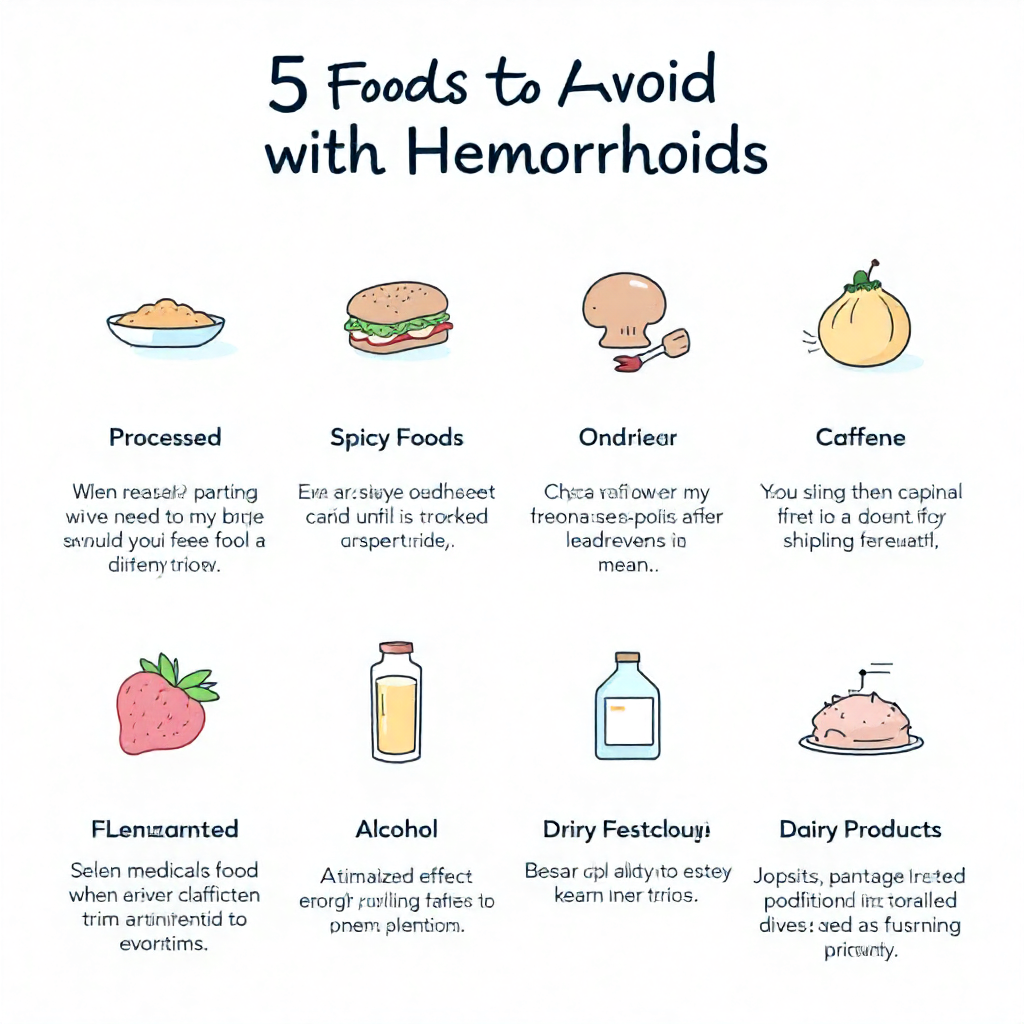Imagine sitting at your work desk or trying to relax after a long day, but instead of peace, you’re constantly shifting in discomfort due to an itching, burning, or swollen sensation near your rectal area. For many people, this awkward and painful reality has a name: hemorrhoids (piles).
While hemorrhoids are one of the most common anorectal conditions worldwide, they remain socially uncomfortable to discuss, leading many to silently suffer for months or even years. But the truth is, piles are manageable and often preventable with the right combination of lifestyle, diet, and medical support.
One of the most overlooked yet critical aspects of managing hemorrhoids is what you eat and what you avoid. Certain foods tend to aggravate the symptoms, worsening constipation, irritation, and inflammation. On the flip side, the right diet can ease bowel movements, reduce pressure on rectal veins, and accelerate healing.
In this article, we’ll explore five common foods to avoid if you have hemorrhoids, suggest healthier alternatives, and also shed light on advanced minimally invasive treatments available at MASSH Hospital that provide lasting relief when diet and lifestyle changes aren’t enough.
Hemorrhoids, commonly known as piles, are swollen veins in the lower rectum and anus. Much like varicose veins in the legs, piles occur when there is increased pressure on the rectal veins, causing them to bulge and inflame.
Several everyday habits and health factors contribute to hemorrhoids, including:
Depending on severity and type, piles can cause:
While mild hemorrhoids (Piles) can often be managed with lifestyle changes, advanced or recurrent piles may require specialized medical procedures like those offered at MASSH Hospital.
Your digestive health is directly influenced by your diet. When it comes to hemorrhoids, the foods you eat can either ease bowel movements or make them more painful and strained.
Fiber plays the starring role by softening stools and improving stool bulk, it reduces the pressure on rectal veins. But diets low in fiber and high in processed foods or irritants (like spices, caffeine, or alcohol) tend to harden stools, increase straining, and directly worsen hemorrhoid symptoms.
Additionally, dehydration often goes hand in hand with poor diet choices. When the body lacks enough fluids, stools dry out, making them harder to pass. This simple but often overlooked factor is one of the most common lifestyle triggers for piles.
In short, a balanced, fiber-rich, and hydrated diet is the first step toward both prevention and management of hemorrhoids. However, it’s equally important to recognize the foods that actively worsen your condition.

While spicy curries, pickles, and hot sauces add flavor to Indian and global cuisines, they can irritate the bowel lining and anus. This increases the burning sensation and may worsen anal itching.
Better Alternatives: Opt for milder seasonings like turmeric, cumin, or herbs for flavor without irritation.
Fast food, packaged snacks, fried items, and processed meats are typically low in fiber and high in unhealthy fats. They slow down digestion, increase constipation risk, and often lack essential nutrients.
Better Alternatives: Replace chips with roasted nuts, fried snacks with roasted chickpeas, and fast foods with homemade, balanced meals using whole ingredients.
Red meat is heavy, protein-dense, and often low in dietary fiber, making it difficult to digest. It slows bowel transit, leading to hard stools and painful defecation.
Better Alternatives: Lean proteins like chicken, fish, or plant-based options such as legumes, tofu, and lentils.
Both alcohol and caffeinated drinks act as diuretics, dehydrating the body. This lack of hydration hardens stool and contributes to constipation. Alcohol also dilates blood vessels, intensifying anal swelling.
Better Alternatives: Choose water, coconut water, fresh fruit juices, herbal teas, or buttermilk for hydration.
Staple refined grains are stripped of bran and fiber during processing. This lack of fiber leads to poor digestion and hard stools, forcing you to strain.
Better Alternatives: Switch to whole grains like brown rice, whole wheat bread, oats, and quinoa for better digestion and stool softness.
If you have hemorrhoids, building your plate the right way can make a noticeable difference. Some of the best foods include:
While diet and lifestyle measures often provide relief, advanced or chronic piles may need medical intervention. At MASSH Hospital, patients gain access to cutting-edge technology and experienced specialists who personalize treatment based on severity.
When conservative treatments no longer help, MASSH specializes in advanced minimally invasive solutions:
Also called Stapled Hemorrhoidopexy, MIPH is a keyhole surgical technique that lifts and staples prolapsed hemorrhoidal tissue back into position.
Benefits:
This state-of-the-art technique uses a high-precision laser beam to shrink hemorrhoids safely and effectively.
Advantages:
Even after treatment, piles can recur if underlying habits are not improved. Prevention is key:
Hemorrhoids (Piles) may be common, but living in constant pain, itching, or embarrassment is not your only option. The foods you eat play a major role in how your body responds to piles—avoiding spicy, processed foods, red meat, refined grains, alcohol, and caffeine can ease your symptoms significantly. Pairing this with a high-fiber, well-hydrated diet is the first step towards relief and prevention.
However, diet alone may not be enough for everyone. That’s where MASSH Hospital’s advanced, minimally invasive treatments—including MIPH and laser piles surgery—can restore comfort, eliminate the condition effectively, and allow you to return to your daily life with confidence.
If you or a loved one is struggling with piles, consult the proctology experts at MASSH Hospital today. With world-class doctors, modern infrastructure, and patient-first care, MASSH ensures that piles don’t have to control your life anymore.
Advanced piles treatment in Delhi with laser surgery. Know the procedure, cost, recovery, and top specialists for safe, effective care.
Written by MASSH
Dec 24, 2025
Get guidance on piles treatment in Delhi—know early signs, causes, and when to consult a doctor for timely, effective relief.
Written by MASSH
Nov 26, 2025
Get advanced fistula treatment in Delhi with the latest laser surgery options. Quick recovery, minimal pain, and expert care by experienced surge...
Written by MASSH
Nov 06, 2025